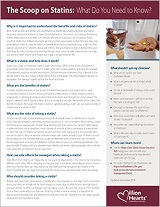The Scoop on Statins: What Do You Need to Know?
Patients may have questions about taking statins to manage their high cholesterol. Click on each question to get the scoop on statins.
- Why is it important to understand the benefits and risks of statins?
- What is a statin and how does it work?
- What are the benefits of statins?
- What are the risks of a statin?
- How can side effects be managed when taking a statin?
- Who should consider taking a statin?
- What should I ask my clinician?
- Where can I learn more?
Featured Tool

The Scoop on Statins: What Do You Need to Know?
Share this one-page version with patients who need to know the benefits and risks of statins, how statins work, and who should be using them. This Q&A also includes resources for more information.
Why is it important to understand the benefits and risks of statins?
Most heart attacks and strokes are preventable by practicing a healthy lifestyle, and when necessary, taking medications to lower blood pressure or cholesterol or to help quit smoking. Statins, when used as indicated, can dramatically reduce a person’s risk of having a heart attack or stroke, but millions of people are missing that opportunity. Some clinicians may miss prescribing a statin to a person who can benefit. Many times, individuals stop or do not start taking a statin due to concerns about side effects. The good news is that understanding your individual benefits and risks and working through your concerns with your clinician can help you prevent heart attacks and strokes and enjoy a longer, healthier life.
What is a statin and how does it work?
Statins are a class of medicines used to lower cholesterol. While some of the cholesterol in your blood comes from food, most is made by the liver. Statins work by reducing the amount of cholesterol made by the liver and helping the liver remove cholesterol that is already in the blood. Statins may also reduce inflammation in the artery walls. This can lead to blockages that damage organs such as the heart and brain.
What are the benefits of statins?
Scientific studies and years of use all over the world have proven that statins, when used as indicated, reduce a person’s chances of having a heart attack or stroke; needing surgery, angioplasty, or stenting to improve blood flow in an artery; and dying from a heart attack. The higher a person’s risk of having a heart attack or stroke, the stronger the benefit of the statin. The benefit increases the longer the statin is taken. In general, taking a statin can cut a person’s risk of a heart attack or stroke in half.
What are the risks of a statin?
Serious risks are rare. Studies involving thousands of people show no differences in muscle aches, liver abnormalities, dementia, memory problems, or cancer between those taking a statin and those on an inactive pill. Despite these findings, just over one in four people (29%) taking a statin describes some symptom, most commonly muscle aches or weakness. It is important to note that muscle-related symptoms are also common with aging and in active adults who are not on statins. Very uncommon risks associated with statins including a type of stroke caused by bleeding, muscle damage that can usually be detected with a blood test, and increased blood sugar levels or new-onset diabetes in those who are prone to developing diabetes. The large benefit of taking statins to prevent heart attacks and strokes likely outweighs the small risk associated with an elevated blood sugar level.
How can side effects be managed when taking a statin?
Side effects from statins can frequently be managed by adjustments in the dose or by choosing a different statin drug. Before stopping or changing your medication, please discuss your concerns with your clinician, who can help determine the likelihood that symptoms are related to the statin. Together you can map out a practical plan to keep you safe from heart attack and stroke.
Who should consider taking a statin?
People who have had a heart attack or stroke, who have diabetes or very high “bad” cholesterol levels, and who are at high risk for heart disease or stroke due to other factors like high blood pressure will live healthier and longer lives by taking a statin. Because the degree of the benefit from a statin varies with your chances of having a heart attack or stroke, it is important to discuss your individual risks and preferences with your clinician. Together you can make a good decision for your healthiest future.
What should I ask my clinician?
- What are my “good” and “bad” cholesterol levels?
- What is my personal risk of a heart attack or stroke?
- For me, is the benefit of taking a statin worth the risk?
- How—and how soon—will we know that the statin is working for me?
- Can I quit or decrease the statin if I lose weight? Exercise daily? Eat differently?
- How soon could I feel a side effect, and what should I do about it?
- How often will I need follow-up blood tests or check-ups?
- What is the next step if a statin doesn’t work or if I can’t take it?
Where can I learn more?
- Use the Mayo Clinic Statin Choice Decision Aid during your next visit with your healthcare professional to help decide if statins are right for you.
- For more information on cholesterol, visit https://millionhearts.hhs.gov/tools-protocols/tools/cholesterol-management.html.
- Watch a short animated video below about how statins prevent heart attacks and strokes by lowering your cholesterol levels.
